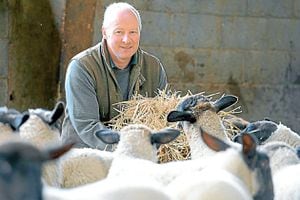Mixed reaction as farmers could be paid up to £100,000 to retire
Farmers in Shropshire have been reacting to the news that older farmers in England could be paid up to £100,000 to help them leave the industry as part of a government drive to attract new talent into agriculture.

The average farmer could receive a lump sum payment of £50,000 – capped at £100,000 for farmers with the most land.
It is part of a massive overhaul of farm grants, incentivising farmers to protect the environment.
Environment Secretary George Eustice believes some older farmers are resistant to new 'green' methods and is encouraging them to move on.
But the scheme has been met with mixed reaction from farmers in Shropshire who have welcomed incentives to attract younger people into the industry, but believe the older generation is still capable of dealing with future environmental challenges.
Oswestry farmer Malcolm Roberts, NFU regional board chairman, said: “There will be many Shropshire farmers shaking their heads over any talk of pensioning them off prematurely, however, it will be an individual business choice.
“Many of us work with our families and that includes the next generation coming through, but the older generation is more than capable of dealing with the challenges ahead as we have dealt with the many issues that have stretched or tested us before.
“We are a resilient bunch and we have to adapt and change all the time, we’re proud to be food producers and while we need to bring new blood through their needs to be serious consideration about how this can be done with proper incentives to help newcomers get on the farming ladder.
Encourages
“The NFU represents all type of farms, including smaller family farms, tenanted businesses and larger commercial operations, and the union will consult extensively with Shropshire members to understand our views on these proposals.”
Currently, under the old EU system, farmers receive grants based largely on the amount of land they farm.
The average farmer currently receives about £21,000 in grants – although those who own large amounts of land, such as the Queen, have been receiving more than half a million pounds each year.
Mr Eustice said the EU's grants system encourages some farmers "to coast, to take no risks" and hold on to their land in order to collect the subsidy.
At the Oxford Farming Conference earlier this year, Mr Eustice said some veteran farmers were "standing in the way of change" and coasting along on state subsidies.
He said: "I understand the burden of expectation that can exist to loyally continue the family tradition (of farming) and how this sometimes stands in the way of change."
But, he added: "A fresh perspective can make a world of difference. New entrants are the lifeblood of any vibrant industry and farming is no exception."
Nearly four in 10 UK farmers are over the age of 65, with an average age of 59.
Richard Yates, who farms at Middleton Scriven, near Bridgnorth, believes some farmers would find the incentive attractive, but warned the devil was in the detail.
"I am sure anybody 60-plus would be interested and there will be some who are not keen to get on the journey to net zero, but let's see what is in the detail," he said.
Outstanding
"We face major environmental challenges and there will be farmers willing to do their part in achieving carbon neutral.
"There are also some outstanding young farmers who have been educated at university that are awash with some great new ideas."
Mr Yates added: "In two months time the Yates family will have farmed here 50 years. Sadly my father passed away last year, but I have two daughters who are keen on the industry so we will see where we go.
"Whatever happens, we will be dictated by government policy and will be interested to see what offers are on the table."
The Tenant Farmers' Association sought the views of 360 farmers and reported that three-quarters of them were seriously interested in the proposed retirement scheme, which has gone out to consultation.
The organisation's chief executive, George Dunn, supported the plan for a lump sum for farmers based on the grants they would have received if they had stayed in business.
But he warned: "The Government have got to make it easy enough for people to take up the scheme – not drown them in bureaucracy.
"The payments on their own won't be enough – but when you tie in other factors such as selling livestock, some farmers will want to take it up.
"For people on larger holdings, it won't be very attractive – but a lot of owner-occupiers might find it attractive."





